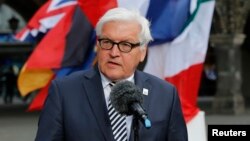Foreign ministers of the Group of Seven industrialized countries are meeting in Luebeck, Germany, to discuss issues ranging from Ebola to arms control as they prepare for the G7 summit in June.
The agenda for this gathering is daunting - Libya, Yemen, Boko Haram, Syria, Ukraine and the Islamic State group, just to name a few items. The meeting host, German Foreign Minister Frank-Walter Steinmeier, said the many crises around the world are likely to persist for some time.
“This type of crisis management is something that will probably be normal for the coming months and years,” Steinmeier said as he prepared to greet the visiting ministers.
Various combinations of these same ministers meet frequently in the cross-cutting organizations of the European Union, NATO, the Group of 20 and other forums.
Several of them are involved in the negotiations with Iran over its nuclear program, which reached a framework agreement two weeks ago. Steinmeier urged critics of the framework to be patient as negotiators work toward a full agreement by the end of June.
Countries ranging from China to Brazil to India hold increasing sway in some organizations and on some issues, but the Group of Seven is where the key post-World War II powers work on their own to try to influence world events, and to assert their own continuing relevance.
And when there are crises, the world still often calls on Britain, France, Germany, Italy, Japan, Canada and the United States to help solve them.
The European Union also participates in G7 meetings, and on Tuesday its foreign affairs chief, Federica Mogherini, told a group of German students that the wealthy countries need to do a better job of preparing for a variety of crises and acting to address them.
“If we see, and when we see, the real danger coming, then we are able to respond,” she said. “What we need to do is to improve our level of political awareness and political will to respond quickly.”
This group has been meeting in various formats for 40 years. Russia was invited to make it the Group of Eight in 1998, but was expelled last year after its annexation of the Ukrainian region of Crimea.
Russia’s ongoing involvement in separatist violence in eastern Ukraine will also be a topic here.
At a separate meeting on Monday, Steinmeier said Russia’s route back into the group involves solving the Ukraine issue. He and French Foreign Minister Laurent Fabius called on Russia to implement an agreement for the disengagement of forces in eastern Ukraine, where fighting has flared in recent days in spite of a cease-fire.
They also called on the Ukrainian government to implement promised political reforms.
Tuesday was a light day for the ministers, with a reception and informal dinner. U.S. Secretary of State John Kerry was not expected until Wednesday, when the formal meetings will take up the long list of difficult issues.
LUEBECK, GERMANY —




